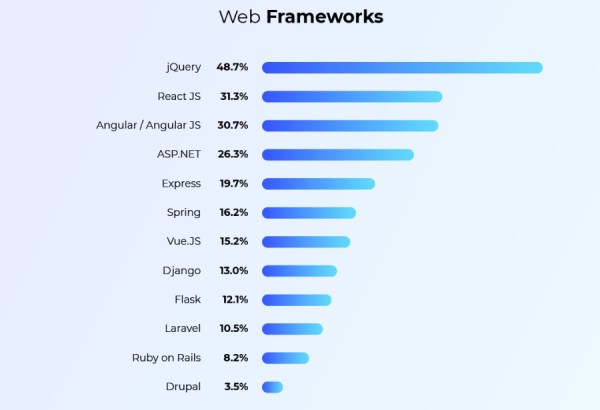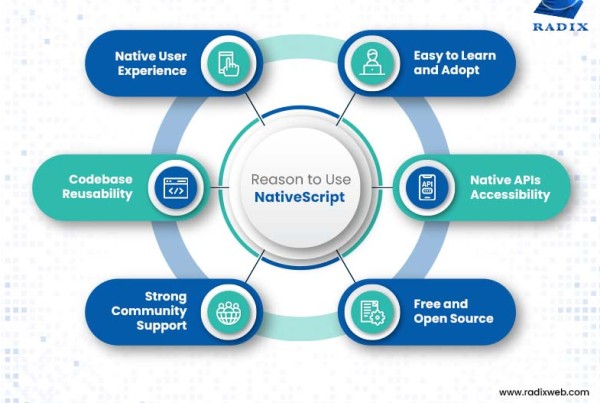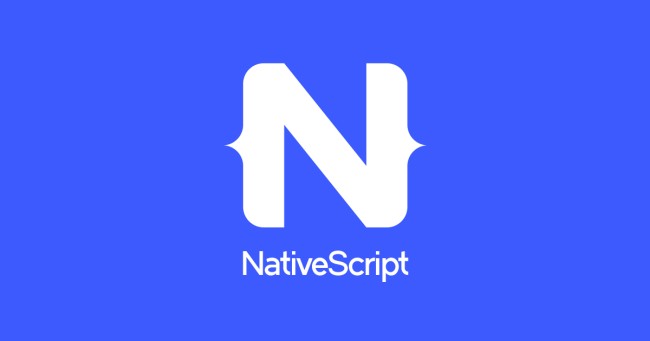Today, many cross-platform mobile app frameworks help developers develop, maintain, and deploy mobile apps fast and efficiently. But when it comes to choosing one of them, many factors come into play.

NativeScript currently powers over 80% of the web code. It continues to grow at an incredibly swift rate that leverages the best parts of JavaScript and the productivity of AngularJS.
You can hire AngularJS developers depending on your project needs. You may need to spend a lot of time building and maintaining your cross-platform mobile app.
What is NativeScript for AngularJS?
NativeScript enables AngularJS mobile app development and allows developers to create native mobile apps with web technologies: HTML, CSS, and JavaScript. This framework has been around for a while and has gained quite a bit of attention in building native apps with AngularJS.
NativeScript for AngularJS enables AngularJS developers to create native mobile apps using JavaScript and HTML5. It combines the best of both worlds: fast development cycles and the ability to reach all major platforms (Android, iOS, Windows Phone 8 & Windows 8).
The NativeScript for AngularJS development framework is free and open source. You don’t need any special hardware or software licenses. If you know JavaScript and understand AngularJS directives, you’re ready to get started!
Why should you consider using NativeScript for AngularJS mobile app development?
You don’t have to learn Objective-C or Java to build a fully native app; instead, you can use the skills you already possess. NativeScript is also extensible and customizable, giving developers back control of their experience.

So why should you consider this platform for your next AngularJS mobile application?
1. Speedier Development
NativeScript mobile apps are built on a JavaScript foundation. As a result, developers can write business logic once and reuse it across multiple platforms. This saves considerable time and effort.
However, NativeScript doesn’t use HTML in the user interface (UI) layer. Like native apps, the UI is constructed using platform-specific APIs and UI elements. So, your app will look like a native app but be much faster to develop.
It also has built-in support for VSCode and WebStorm IDEs, which means you can use the tools that you’re familiar with and enjoy using, complete with code completion, debugging capabilities, etc.
2. Native User Experience
A framework that uses native controls, widgets, and layouts offers a user experience as good as any other native app. In addition, NativeScript’s layout engine allows you to render pages using HTML markup in the same way you do on a web application. There is no need to write different codes for each platform.
This eases the burden on your development team (allowing them to focus on coding instead of learning yet another framework). Still, it also ensures that your user experience will be far more responsive and engaging.
With a NativeScript AngularJS mobile app, you get the best of both worlds — native user experience and Web technology. This also means that AngularJS developers should have no problem with this approach as they can use their existing skills to create a mobile app.
3. One Framework, All Platforms
With NativeScript, you can build iOS and Android apps with the same language. It offers official support for TypeScript and JavaScript, allowing developers to write code in their preferred language.
Most developers who use either AngularJS or NodeJS will know how to work with TypeScript and JavaScript. This means that you don’t have to hire new programmers just because you want to start using a new platform, saving time and money on training and hiring costs.
It should be no surprise that NativeScript works well with AngularJS. You can use the two frameworks to build cross-platform mobile apps with near-native performance and user experience.
4. Existing Web Skills
Progress offers a full range of platforms that allow you to develop an application once and deploy it to any target platform you choose, whether it be native Android or iOS, Windows, Linux, or Mac OS X. These platforms include:
Multi-Device Mobility Platform (MMP) is a complete toolkit for smartphone and tablet app development across Android, iOS, and Windows platforms. It includes everything needed to create great apps: UI design tools, development tools, API libraries, and code samples.
Enterprise Service Bus (ESB) delivers secure messaging services for applications used in business process management (BPM). It offers a standards-based messaging solution supporting SOAP and REST protocols over Web Services and other transports.
5. Rewarding, Rich UI
The most significant advantage of using the AngularJS framework is that it can be used across all platforms, i.e., web, mobile, and desktop. This makes setting up and deploying cross-platform mobile applications easier for designers and developers.
Compared to other frameworks in the market today, AngularJS is lightweight, making it a perfect choice for developing efficient mobile apps.
On top of that, it has built-in directives that enable you to use HTML syntax for your application logic and create dynamic views. This helps develop fast and reduces the amount of code required to create UI components.
6. Safe and Secure Platform
NativeScript uses only native APIs and components, which means it doesn’t face the same security risks hybrid applications face.
It uses native APIs whenever possible and follows the principle of progressive enhancement when building out functionality for a mobile application. For example, native CSS animations are used for simple animations instead of JavaScript animations, ensuring better performance in your application.
Because everything is stored online, it can be protected by firewalls and other security measures. A person who manages to hack into your system would only have access to that one site. They wouldn’t be able to access any other part of your network or information.
7. Offers Seamless Upgradation
NativeScript is a platform that allows the development of native apps using both JavaScript and AngularJS. It eliminates the need to perform any manual code conversion or technical workarounds, offering seamless upgradeability.
It has a growing community of developers who use it to create native-looking apps for Android and iOS with high performance and native capabilities.
In fact, NativeScript allows you to build mobile AngularJS applications for various platforms such as Android, iOS, Windows Azure, Windows Phone 8.1, Firefox OS, and more.
Bottom Line
NativeScript is the fastest-growing framework for building truly native mobile apps with AngularJS. It boasts a handful of unique features that make it an excellent fit for developers who have to support multiple platforms and many devices.
Whether working on an enterprise or consumer app, you can use NativeScript’s Angular-based SDK to create user interfaces and run your applications.
